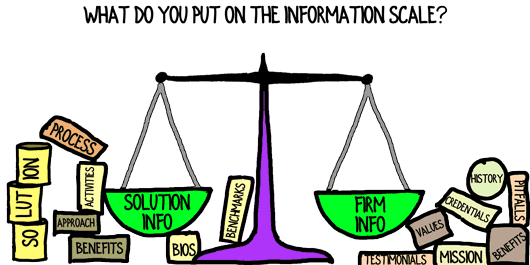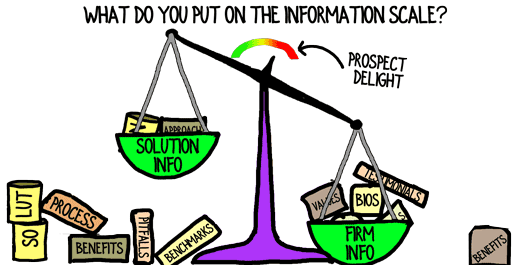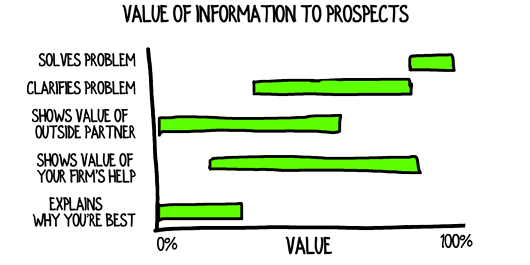Jordan Jamswiper, COO of the “My Toast” empire of breakfast products, revealed to you one of the company’s most vexing issues. Then Jordan asked for an overview of how your consulting firm could solve the challenge. Sounds sweet as syrup so far.
However, there’s a real possibility that the information your consulting firm provides will lead Jordan to dismiss your consulting firm rather than engage you. That’s less appetizing. And preventable.
When a prospect asks for help with their problem, you’re faced with a couple of decisions: how much information you should share, and what information you should include.

If you hand Jordan the entire solution, then My Toast won’t need to hire your consulting firm and you’ve passed up on a healthy slice of business. Therefore, you’re reluctant to share too much of your ideas and IP.
On the flip side, since you want to impress your prospects with your consulting firm’s prowess and robust approach, you’re tempted to regale Jordan with the details of your methodology and to lay on the credentials pretty thick.

Unfortunately, that balance of information is not what clients are looking for and is costing you business.
Don’t be afraid of giving advice and sharing IP.
If the team at My Toast can learn everything they need during a one-hour call with your consulting firm or from a whitepaper you share, then they were never going to award a consulting project bigger than a breadbox anyway.
Do be afraid of overwhelming your prospects with information that is about you and not valuable to them. (Information about your consulting firm generally isn’t valuable to them.)
Your consulting firm will always benefit from dispensing the information Jordan and the My Toast team are looking for and trimming back the extraneous material.

Since it can be challenging from inside your consulting firm to objectively evaluate whether the type and depth of your responses to your prospects is on the mark, below are a few guidelines.
4 Signs the Information Your Consulting Firm Provides is Hurting Sales
Those are just four signals to tell you when the information your consulting firm is sharing has shifted from decision-rich to overwhelming and irrelevant. Do you look for any others?
Text and images are © 2024 David A. Fields, all rights reserved.

 David A. Fields Consulting Group
David A. Fields Consulting Group 

Excellent article, David.
A simple test I use is, “Is what I am writing/saying copy-and-paste?”
If it is then, given that clients and their issues are almost always unique, I need to be really convinced that it’s genuinely adding something useful.
That’s a great test, Alan. Consultants often resort to bringing whatever they did for the most recent client to the next client. Using “cut and paste” as an alert to ensure you’re attending appropriately to the client at hand is a smart idea. Thank you for contributing this, Alan.
I always enjoy your blogs, thank you and I agree, you’re right on the money
Thanks for the support, Jody. I enjoy reading your comments!
I think it’s important to use just a brief “elevator pitch” when the client asks you to tell them about your consulting firm. As soon as possible, I always try to turn the discussion into a “doctor’s visit” and ask the client to start talking about the issues they’re concerned about and are trying to address. Get the discussion focused on their problems and suggest ways that you might be able to help them and gauge their reaction.
We’re in agreement, Roger, that focusing the conversation on the client will definitely serve you better than rambling on about yourself and your firm.
And, while I’m not a fan of “elevator pitches” (because I don’t believe most consulting is won by pitching), it’s definitely worthwhile to be able to crisply and concisely communicate the benefits your firm offers! I’m glad you raised both those points, Roger.
Excellent article David. In our proposals, we include a section on the background of what the client is looking for based on our discussions. Then, we lay out a plan as to how we are going to go about to address their needs. Most clients want to know how you are going to do it, not what you have done in the past.
Sounds like you have a good proposal format, Tony. You’re right, most clients are only interested in your past to the extent they need reassurance that you are a reliable provider of a solution. A consulting firm that needs to include a dozen testimonials or case studies with the proposal is probably submitting the proposal too early in the process.
Outstanding example, Tony!
Thanks David – great article, as always – insightful with solutions.
In a number of cases, we have fallen into the “want to impress our clients with our consulting firms prowess and robust approach” and have gone overboard on the details of our methodology.
I have found that many clients really don’t know what they should be asking for. They know what they want, but they don’t know how to get there.
We then give them the WHAT and HOW only to find later they have taken our methodology, re-issued the request for proposal, shopped around for the best bid and gone off without us.
Thanks David, for your insight – we’ll try for a little more balance in the future and look forward to getting more work !
Cheers,
William
Well, that’s a pretty sucky case study, William! Most clients have higher integrity than to shop around your detailed process; however, it’s always worth putting a copyright and confidentiality notice on your proposals. And, while most clients wont shop around your detailed process, clients who are shopping will definitely share general directions.
Of course, the best way through this is to attract more prospects who are only talking with you!
Thanks for the feedback and for sharing your experience, William.